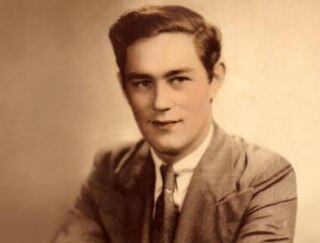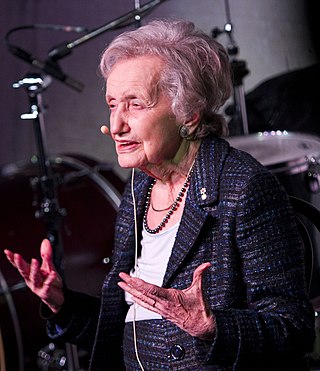Related Research Articles

Cognitive neuropsychology is a branch of cognitive psychology that aims to understand how the structure and function of the brain relates to specific psychological processes. Cognitive psychology is the science that looks at how mental processes are responsible for our cognitive abilities to store and produce new memories, produce language, recognize people and objects, as well as our ability to reason and problem solve. Cognitive neuropsychology places a particular emphasis on studying the cognitive effects of brain injury or neurological illness with a view to inferring models of normal cognitive functioning. Evidence is based on case studies of individual brain damaged patients who show deficits in brain areas and from patients who exhibit double dissociations. Double dissociations involve two patients and two tasks. One patient is impaired at one task but normal on the other, while the other patient is normal on the first task and impaired on the other. For example, patient A would be poor at reading printed words while still being normal at understanding spoken words, while the patient B would be normal at understanding written words and be poor at understanding spoken words. Scientists can interpret this information to explain how there is a single cognitive module for word comprehension. From studies like these, researchers infer that different areas of the brain are highly specialised. Cognitive neuropsychology can be distinguished from cognitive neuroscience, which is also interested in brain damaged patients, but is particularly focused on uncovering the neural mechanisms underlying cognitive processes.

Henry Gustav Molaison, known widely as H.M., was an American who had a bilateral medial temporal lobectomy to surgically resect the anterior two thirds of his hippocampi, parahippocampal cortices, entorhinal cortices, piriform cortices, and amygdalae in an attempt to cure his epilepsy. Although the surgery was partially successful in controlling his epilepsy, a severe side effect was that he became unable to form new memories.

The temporal lobe is one of the four major lobes of the cerebral cortex in the brain of mammals. The temporal lobe is located beneath the lateral fissure on both cerebral hemispheres of the mammalian brain.
In neurology, anterograde amnesia is the inability to create new memories after the event that caused amnesia, leading to a partial or complete inability to recall the recent past, while long-term memories from before the event remain intact. This is in contrast to retrograde amnesia, where memories created prior to the event are lost while new memories can still be created. Both can occur together in the same patient. To a large degree, anterograde amnesia remains a mysterious ailment because the precise mechanism of storing memories is not yet well understood, although it is known that the regions of the brain involved are certain sites in the temporal cortex, especially in the hippocampus and nearby subcortical regions.

Brenda Milner is a British-Canadian neuropsychologist who has contributed extensively to the research literature on various topics in the field of clinical neuropsychology. Milner is a professor in the Department of Neurology and Neurosurgery at McGill University and a professor of Psychology at the Montreal Neurological Institute. As of 2020, she holds more than 25 honorary degrees and she continued to work in her nineties. Her current work covers many aspects of neuropsychology including her lifelong interest in the involvement of the temporal lobes in episodic memory. She is sometimes referred to as the founder of neuropsychology and has been essential in its development. She received the Balzan Prize for Cognitive Neuroscience in 2009, and the Kavli Prize in Neuroscience, together with John O'Keefe, and Marcus E. Raichle, in 2014. She turned 100 in July 2018 and at the time was still overseeing the work of researchers.
In neurology, retrograde amnesia (RA) is a loss of memory-access to events that occurred or information that was learned in the past. It is caused by an injury or the onset of a disease. It tends to negatively affect episodic, autobiographical, and declarative memory, while keeping procedural memory intact without increasing difficulty for learning new information. RA can be temporally graded, or more permanent based on the severity of its cause. It is usually consistent with Ribot's law. The law states that subjects are more likely to lose memories closer to the traumatic incident than more memories that happened further from the incident. The type of information that is forgotten can range from a specific memory, such as a single event, or a more general memory. This would resemble generic amnesia. Anterograde amnesia is a similar condition that deals with the inability to form new memories following the onset of an injury or disease.
Endel Tulving is an Estonian-born Canadian experimental psychologist and cognitive neuroscientist. In his research on human memory he proposed the distinction between semantic and episodic memory. Tulving is a professor emeritus at the University of Toronto. He joined the Rotman Research Institute at Baycrest Health Sciences in 1992 as the first Anne and Max Tanenbaum Chair in Cognitive Neuroscience and remained there until his retirement in 2010. In 2006, he was named an Officer of the Order of Canada, Canada's highest civilian honour.
Explicit memory is one of the two main types of long-term human memory, the other of which is implicit memory. Explicit memory is the conscious, intentional recollection of factual information, previous experiences, and concepts. This type of memory is dependent upon three processes: acquisition, consolidation, and retrieval. Explicit memory can be divided into two categories: episodic memory, which stores specific personal experiences, and semantic memory, which stores factual information. Explicit memory requires gradual learning, with multiple presentations of a stimulus and response.

Comparative neuropsychology refers to an approach used for understanding human brain functions. It involves the direct evaluation of clinical neurological populations by employing experimental methods originally developed for use with nonhuman animals.
Ribot's law of retrograde amnesia was hypothesized in 1881 by Théodule Ribot. It states that there is a time gradient in retrograde amnesia, so that recent memories are more likely to be lost than the more remote memories. Not all patients with retrograde amnesia report the symptoms of Ribot's law.
Fergus Ian Muirden Craik FRS is a cognitive psychologist known for his research on levels of processing in memory. This work was done in collaboration with Robert Lockhart at the University of Toronto in 1972 and continued with another collaborative effort with Endel Tulving in 1975. Craik has received numerous awards and is considered a leader in the area of memory, attention and cognitive aging. Moreover, his work over the years can be seen in developmental psychology, aging and memory, and the neuropsychology of memory.
Kent Cochrane, also known as Patient K.C., was a widely studied Canadian memory disorder patient who has been used as a case study in over 20 neuropsychology papers over the span of 25 years. In 1981, Cochrane was involved in a motorcycle accident that left him with severe anterograde amnesia, as well as temporally graded retrograde amnesia. Like other amnesic patients, Cochrane had his semantic memory intact, but lacked episodic memory with respect to his entire past. As a case study, Cochrane has been linked to the breakdown of the single-memory single-locus hypothesis regarding amnesia, which states that an individual memory is localized to a single location in the brain.
Retrospective memory is the memory of people, words, and events encountered or experienced in the past. It includes all other types of memory including episodic, semantic and procedural. It can be either implicit or explicit. In contrast, prospective memory involves remembering something or remembering to do something after a delay, such as buying groceries on the way home from work. However, it is very closely linked to retrospective memory, since certain aspects of retrospective memory are required for prospective memory.
The neuroanatomy of memory encompasses a wide variety of anatomical structures in the brain.

Amnesia is a deficit in memory caused by brain damage or disease, but it can also be caused temporarily by the use of various sedatives and hypnotic drugs. The memory can be either wholly or partially lost due to the extent of damage that was caused. There are two main types of amnesia: retrograde amnesia and anterograde amnesia. Retrograde amnesia is the inability to retrieve information that was acquired before a particular date, usually the date of an accident or operation. In some cases the memory loss can extend back decades, while in others the person may lose only a few months of memory. Anterograde amnesia is the inability to transfer new information from the short-term store into the long-term store. People with anterograde amnesia cannot remember things for long periods of time. These two types are not mutually exclusive; both can occur simultaneously.
Arthur Paul Shimamura was a professor of psychology and faculty member of the Helen Wills Neuroscience Institute at the University of California, Berkeley. His research focused on the neural basis of human memory and cognition. He received his BA in experimental psychology from the University of California, Santa Barbara in 1977 and his PhD in cognitive psychology from the University of Washington in 1982. He was a post-doctoral fellow in the laboratory of Larry Squire, where he studied amnesic patients. In 1989, Shimamura began his professorship at UC Berkeley. He has published over 100 scientific articles and chapters, was a founding member of the Cognitive Neuroscience Society, and has been science advisor for the San Francisco Exploratorium science museum.

Childhood memory refers to memories formed during childhood. Among its other roles, memory functions to guide present behaviour and to predict future outcomes. Memory in childhood is qualitatively and quantitatively different from the memories formed and retrieved in late adolescence and the adult years. Childhood memory research is relatively recent in relation to the study of other types of cognitive processes underpinning behaviour. Understanding the mechanisms by which memories in childhood are encoded and later retrieved has important implications in many areas. Research into childhood memory includes topics such as childhood memory formation and retrieval mechanisms in relation to those in adults, controversies surrounding infantile amnesia and the fact that adults have relatively poor memories of early childhood, the ways in which school environment and family environment influence memory, and the ways in which memory can be improved in childhood to improve overall cognition, performance in school, and well-being, both in childhood and in adulthood.
In psychology, confabulation is a memory error defined as the production of fabricated, distorted, or misinterpreted memories about oneself or the world. It is generally associated with certain types of brain damage or a specific subset of dementias. While still an area of ongoing research, the basal forebrain is implicated in the phenomenon of confabulation. People who confabulate present with incorrect memories ranging from subtle inaccuracies to surreal fabrications, and may include confusion or distortion in the temporal framing of memories. In general, they are very confident about their recollections, even when challenged with contradictory evidence.
A personal-event memory is an individual's memory of an event from a certain moment of time. Its defining characteristics are that it is for a specific event; includes vivid multi-sensory elements ; is usually recalled in detail; and is usually believed by the individual to be an accurate representation of the event.

Donald Thomas Stuss OC, OOnt, FRSC, FCAHS was a Canadian neuropsychologist who studied the frontal lobes of the human brain. He also directed the Rotman Research Institute at Baycrest from 1989 until 2009 and the Ontario Brain Institute from 2011 until 2016.
References
- ↑ "Catharine West, The Observer (Association for Psychological Science)" . Retrieved 22 March 2011.
- ↑ "Morris Moscovitch's Homepage" . Retrieved 30 December 2008.
- ↑ "Governor General Announces 61 New Appointments to the Order of Canada" . Retrieved 2 January 2021.